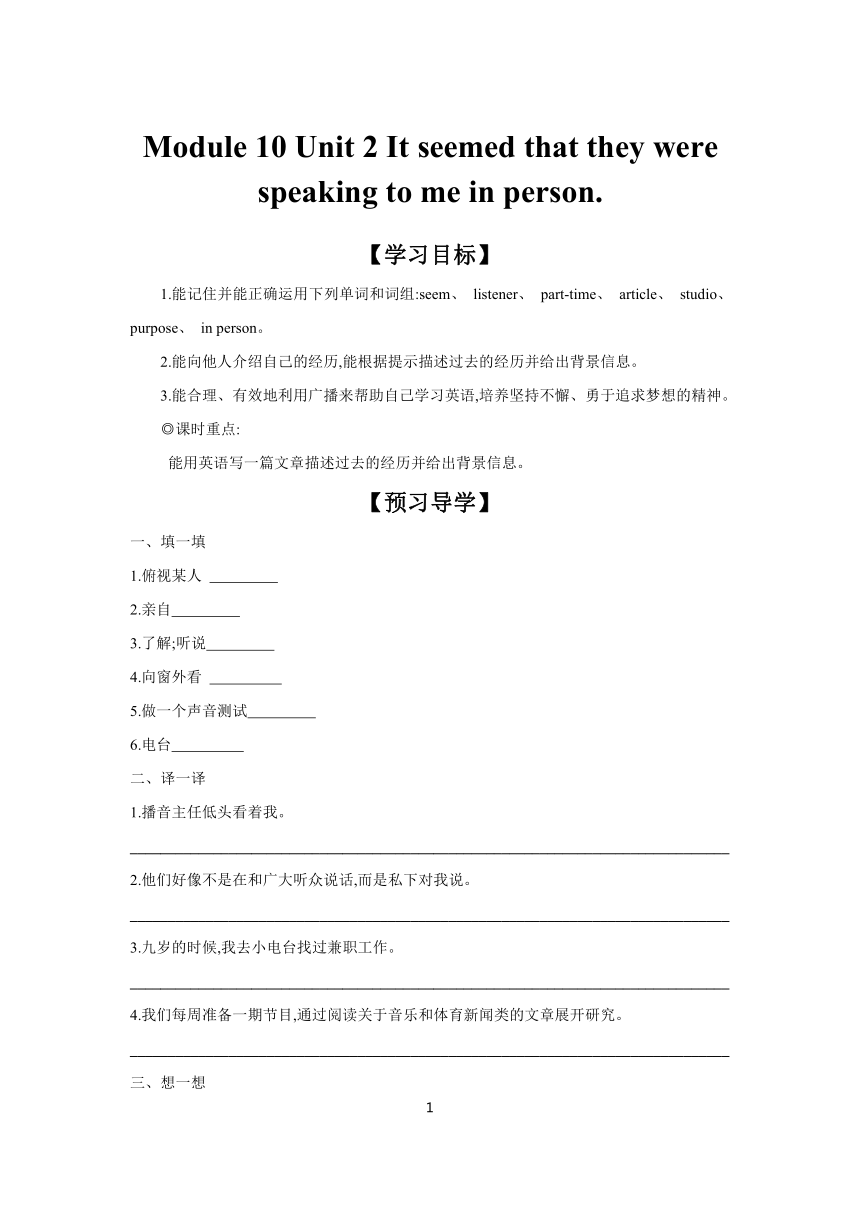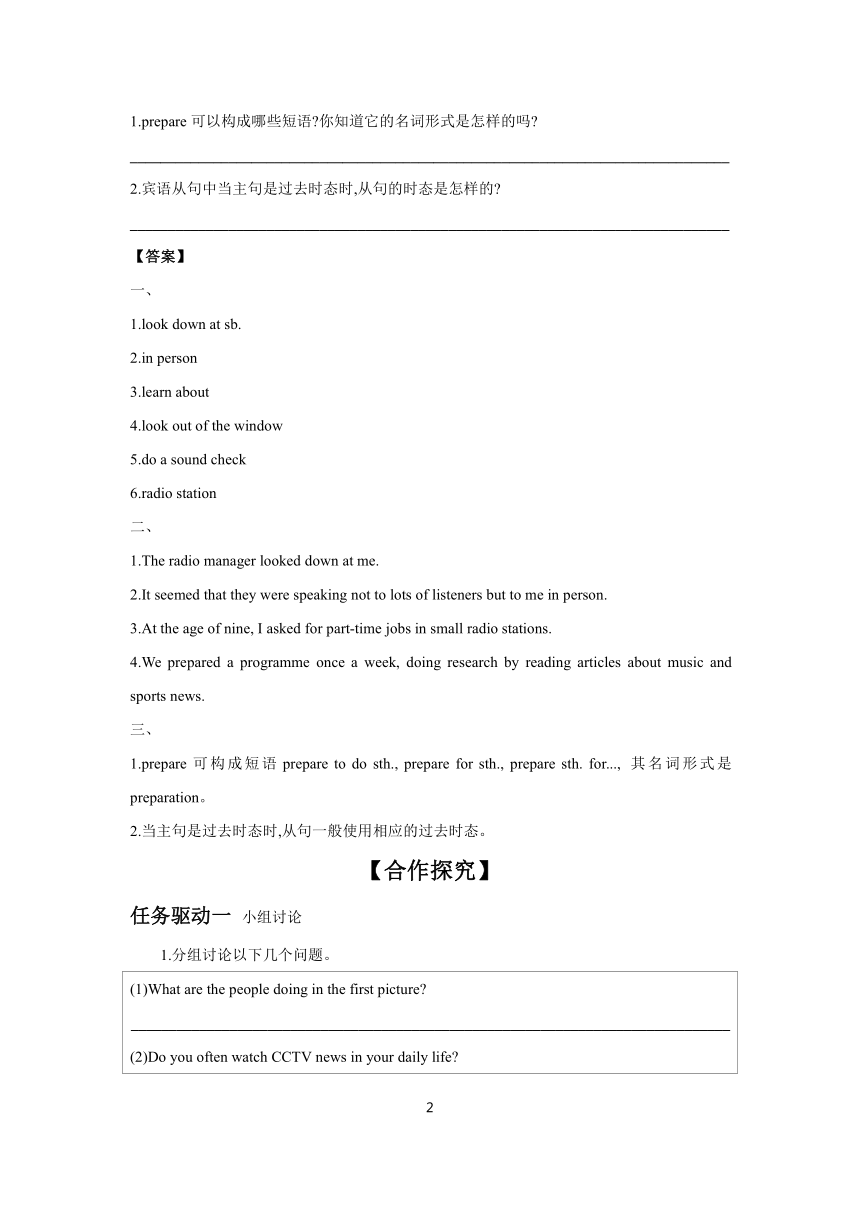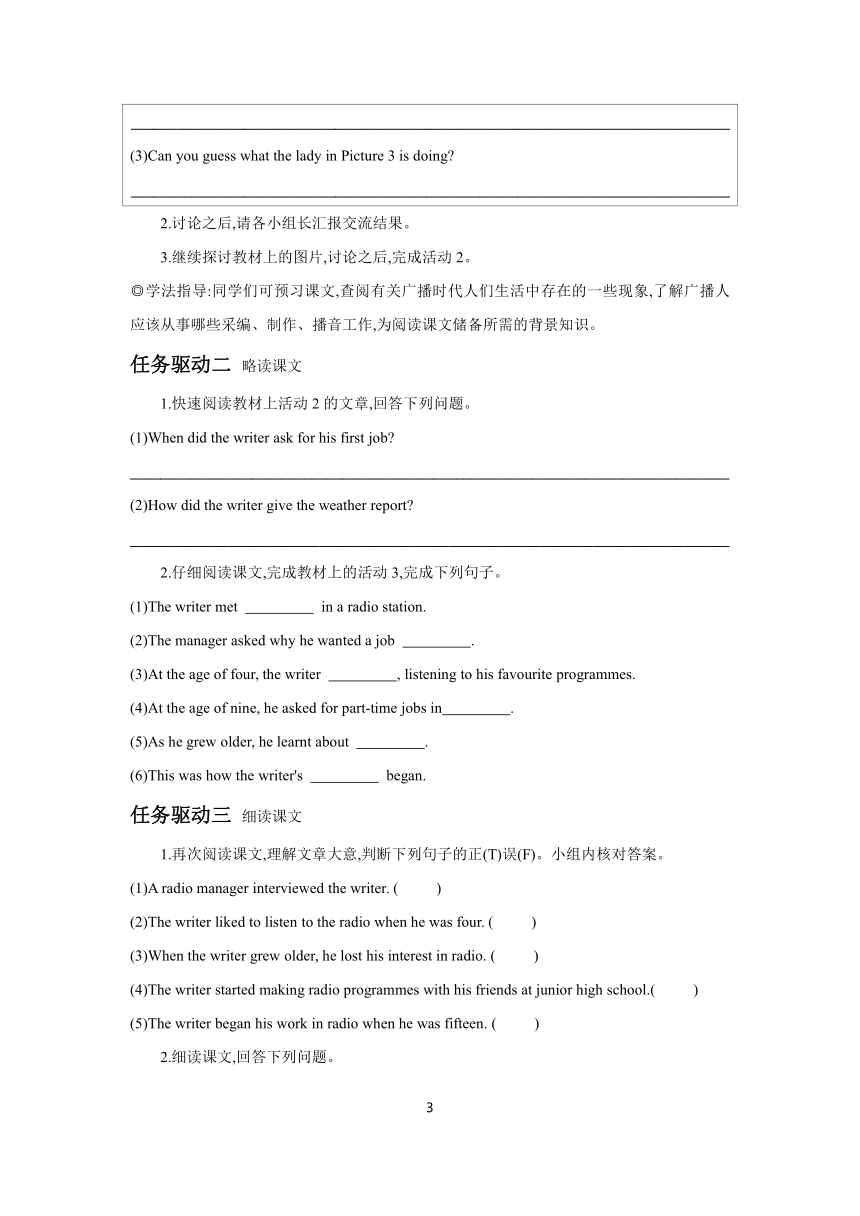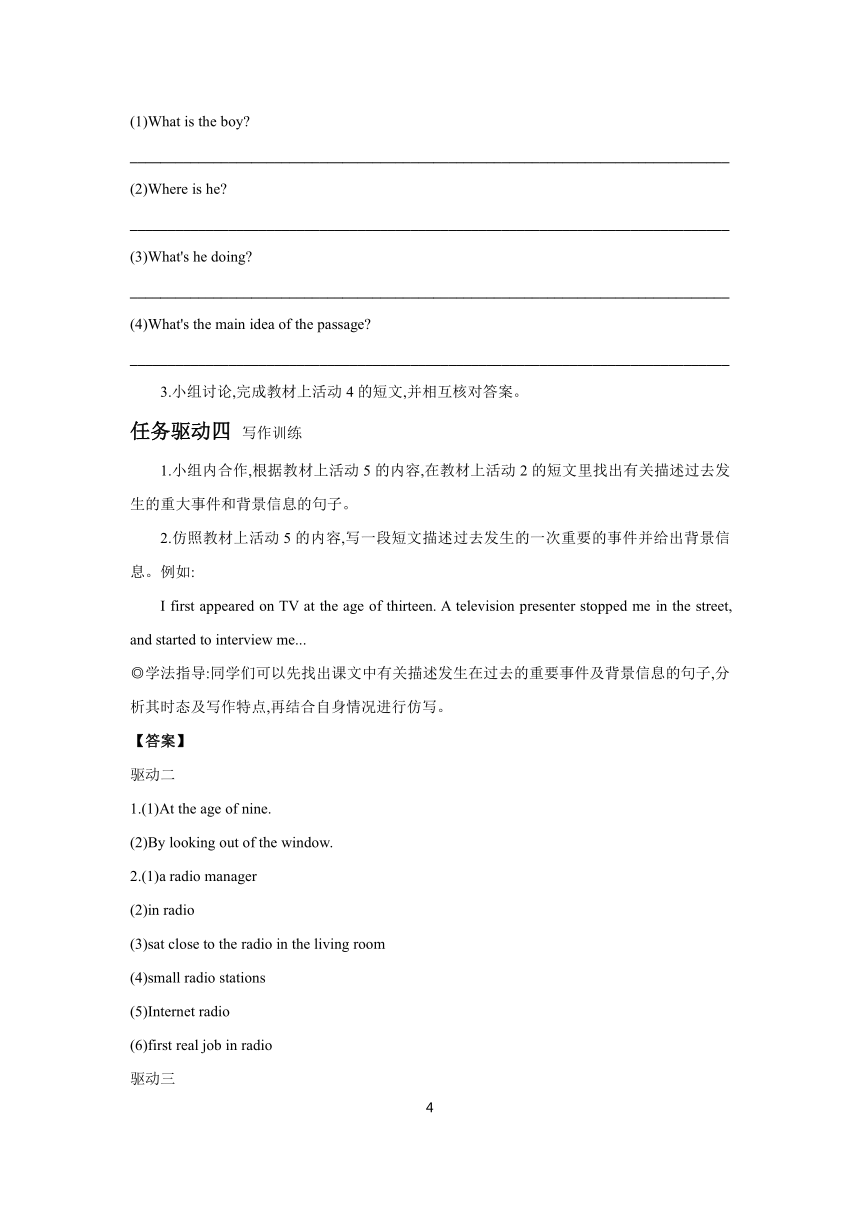Module 10 Unit 2 It seemed that they were speaking to me in person. 学案(含答案) 2023-2024学年初中英语外研版八年级下册
文档属性
| 名称 | Module 10 Unit 2 It seemed that they were speaking to me in person. 学案(含答案) 2023-2024学年初中英语外研版八年级下册 |

|
|
| 格式 | docx | ||
| 文件大小 | 27.0KB | ||
| 资源类型 | 教案 | ||
| 版本资源 | 外研版 | ||
| 科目 | 英语 | ||
| 更新时间 | 2024-02-27 00:00:00 | ||
图片预览




文档简介
Module 10 Unit 2 It seemed that they were speaking to me in person.
【学习目标】
1.能记住并能正确运用下列单词和词组:seem、 listener、 part-time、 article、 studio、 purpose、 in person。
2.能向他人介绍自己的经历,能根据提示描述过去的经历并给出背景信息。
3.能合理、有效地利用广播来帮助自己学习英语,培养坚持不懈、勇于追求梦想的精神。
◎课时重点:
能用英语写一篇文章描述过去的经历并给出背景信息。
【预习导学】
一、填一填
1.俯视某人
2.亲自
3.了解;听说
4.向窗外看
5.做一个声音测试
6.电台
二、译一译
1.播音主任低头看着我。
_______________________________________________________________________________
2.他们好像不是在和广大听众说话,而是私下对我说。
_______________________________________________________________________________
3.九岁的时候,我去小电台找过兼职工作。
_______________________________________________________________________________
4.我们每周准备一期节目,通过阅读关于音乐和体育新闻类的文章展开研究。
_______________________________________________________________________________
三、想一想
1.prepare可以构成哪些短语 你知道它的名词形式是怎样的吗
_______________________________________________________________________________
2.宾语从句中当主句是过去时态时,从句的时态是怎样的
_______________________________________________________________________________
【答案】
一、
1.look down at sb.
2.in person
3.learn about
4.look out of the window
5.do a sound check
6.radio station
二、
1.The radio manager looked down at me.
2.It seemed that they were speaking not to lots of listeners but to me in person.
3.At the age of nine, I asked for part-time jobs in small radio stations.
4.We prepared a programme once a week, doing research by reading articles about music and sports news.
三、
1.prepare可构成短语prepare to do sth., prepare for sth., prepare sth. for..., 其名词形式是preparation。
2.当主句是过去时态时,从句一般使用相应的过去时态。
【合作探究】
任务驱动一 小组讨论
1.分组讨论以下几个问题。
(1)What are the people doing in the first picture _______________________________________________________________________________ (2)Do you often watch CCTV news in your daily life _______________________________________________________________________________ (3)Can you guess what the lady in Picture 3 is doing _______________________________________________________________________________
2.讨论之后,请各小组长汇报交流结果。
3.继续探讨教材上的图片,讨论之后,完成活动2。
◎学法指导:同学们可预习课文,查阅有关广播时代人们生活中存在的一些现象,了解广播人应该从事哪些采编、制作、播音工作,为阅读课文储备所需的背景知识。
任务驱动二 略读课文
1.快速阅读教材上活动2的文章,回答下列问题。
(1)When did the writer ask for his first job
_______________________________________________________________________________
(2)How did the writer give the weather report
_______________________________________________________________________________
2.仔细阅读课文,完成教材上的活动3,完成下列句子。
(1)The writer met in a radio station.
(2)The manager asked why he wanted a job .
(3)At the age of four, the writer , listening to his favourite programmes.
(4)At the age of nine, he asked for part-time jobs in .
(5)As he grew older, he learnt about .
(6)This was how the writer's began.
任务驱动三 细读课文
1.再次阅读课文,理解文章大意,判断下列句子的正(T)误(F)。小组内核对答案。
(1)A radio manager interviewed the writer. ( )
(2)The writer liked to listen to the radio when he was four. ( )
(3)When the writer grew older, he lost his interest in radio. ( )
(4)The writer started making radio programmes with his friends at junior high school.( )
(5)The writer began his work in radio when he was fifteen. ( )
2.细读课文,回答下列问题。
(1)What is the boy
_______________________________________________________________________________
(2)Where is he
_______________________________________________________________________________
(3)What's he doing
_______________________________________________________________________________
(4)What's the main idea of the passage
_______________________________________________________________________________
3.小组讨论,完成教材上活动4的短文,并相互核对答案。
任务驱动四 写作训练
1.小组内合作,根据教材上活动5的内容,在教材上活动2的短文里找出有关描述过去发生的重大事件和背景信息的句子。
2.仿照教材上活动5的内容,写一段短文描述过去发生的一次重要的事件并给出背景信息。例如:
I first appeared on TV at the age of thirteen. A television presenter stopped me in the street, and started to interview me...
◎学法指导:同学们可以先找出课文中有关描述发生在过去的重要事件及背景信息的句子,分析其时态及写作特点,再结合自身情况进行仿写。
【答案】
驱动二
1.(1)At the age of nine.
(2)By looking out of the window.
2.(1)a radio manager
(2)in radio
(3)sat close to the radio in the living room
(4)small radio stations
(5)Internet radio
(6)first real job in radio
驱动三
1.(1)T (2)T (3)F (4)T (5)F
2.(1)He is a radio presenter.
(2)He is in the studio.
(3)He is reading the news.
(4)The main idea of the passage is about how the writer found his first real job as a radio presenter.
【知识超市】
●I sat close to the radio in the living room, listening to my favourite programmes and to the voices of my favourite presenters.我坐在起居室里的收音机旁,听着我最喜欢的节目和我最喜欢的主持人的声音。
1.close to 意为“临近;靠近”, sit close to 意为“坐在……的旁边”。例如:
Take away the box close to the desk.拿走桌子旁的那个盒子。
2.listening to my favourite programmes and to the voices of my favourite presenters在句中作状语,表示伴随情况。例如:
Passing by the house, he saw a girl playing the piano.当他经过那所房子时,他看到一个女孩在弹钢琴。
Mr. Xu walked into the classroom, looking around the whole classroom. 许老师走进教室,向四周看了看。
做一做:单项选择。
( )The boy sits at the window, out of the window.
A.looking B.showing
C.watching D.noticing
●It seemed that they were speaking not to lots of listeners but to me in person.他们好像不是在和广大听众说话,而是私下对我说。
seem意为“似乎;好像”, 可用作连系动词或不及物动词,其常见用法归纳如下:
1.“主语+ seem (+to be)+表语”,表语多为名词或形容词,有时是其他的词或短语,以说明主语的特征或状态。例如:
Tom seems (to be) a very clever boy. 汤姆看上去是一个非常聪明的男孩。
The man over there seems to be a new teacher. 那边的那个人看上去像一位新老师。
Mr. Black seemed to be quite happy. 布莱克先生好像十分快乐。
2.“主语+ seem + 不定式”,此句型中的seem与不定式一起构成复合谓语。例如:
Mrs. Green doesn't seem (或seems not) to like the idea. 格林夫人似乎不太喜欢这个主意。
The children seemed to be eating something in the room. 孩子们好像正在房间里吃东西。
The young man seemed to have changed much. 这个年轻人看起来变化很大。
3.“It seems + that从句”,其中It 是形式主语,that引导主语从句。例如:
It seems that no one knows what has happened in the park. 似乎没有人知道在公园里发生了什么事。
It seems to me that Mr. Brown will not come again. 在我看来布朗先生不会再来了。
做一做:单项选择。
( )1.—You seem . What's wrong
—My son hurt his leg this morning.
A.worry B.worried
C.to worried D.be worried
( )2. that they haven't known the bad news.
A.It seems B.It seemed
C.They seem D.They seemed
●宾语从句的时态
1.当主句是现在时态时,从句可以根据实际情况选择不同时态。现在时包括一般现在时、现在进行时和现在完成时。例如:
He tells us that he will go shopping later.他告诉我们待会儿他会去购物。
I don't know why you were surprised.我不知道你为什么会惊讶。
2.当主句是过去时态时,从句一般使用相应的过去时态。过去时态包括一般过去时、过去进行时、过去将来时和过去完成时。例如:
I heard that how you felt.我听说了你的感受。
He asked if he could watch TV after finishing his homework.他问他是否可以在完成作业后看电视。
3.当宾语从句为客观事实、客观真理时,要用一般现在时。例如:
He told me that the earth goes round the sun.他告诉我地球围着太阳转。
[做一做]单项选择。
( )1.Could you tell me where yesterday
A.did you go B.you go
C.you have gone D.you went
( )2.They want to know .
A.where is the hospital
B.how old are you
C.when the train will leave
D.why is the boy crying
( )3.The old man asked me .
A.where was the cinema
B.where is the cinema
C.where the cinema was
D.where was the way to the cinema
( )4.Have you decided for Australia
A.when will you leave
B.when do you leave
C.you will leave when
D.when you will leave
( )5.Can you tell me
A.where does Tom live
B.where Tom lived
C.Tom lives where
D.where Tom lives
对点自测
( )1.I didn't write down he said because he spoke too quickly.
A.what B.how
C.where D.when
( )2.The presenter has a very pleasant . Many people like his programme.
A.answer B.shape
C.voice D.trip
( )3.Sally thought she needed the room before her parents came back home.
A.clean B.cleaned
C.cleaning D.to clean
( )4.He seems his children.
A.to worry B.worry about
C.worrying about D.to worry about
( )5.The girl sat close to the computer, her favourite programmes.
A.listen B.listening
C.listen to D.listening to
【答案】
[做一做]
A
[做一做]
1~2 BA
[做一做]
1~5 DCCDD
对点自测
1~5 ACDDD
【学习反思】
_______________________________________________________________________________
_______________________________________________________________________________
_______________________________________________________________________________
2
【学习目标】
1.能记住并能正确运用下列单词和词组:seem、 listener、 part-time、 article、 studio、 purpose、 in person。
2.能向他人介绍自己的经历,能根据提示描述过去的经历并给出背景信息。
3.能合理、有效地利用广播来帮助自己学习英语,培养坚持不懈、勇于追求梦想的精神。
◎课时重点:
能用英语写一篇文章描述过去的经历并给出背景信息。
【预习导学】
一、填一填
1.俯视某人
2.亲自
3.了解;听说
4.向窗外看
5.做一个声音测试
6.电台
二、译一译
1.播音主任低头看着我。
_______________________________________________________________________________
2.他们好像不是在和广大听众说话,而是私下对我说。
_______________________________________________________________________________
3.九岁的时候,我去小电台找过兼职工作。
_______________________________________________________________________________
4.我们每周准备一期节目,通过阅读关于音乐和体育新闻类的文章展开研究。
_______________________________________________________________________________
三、想一想
1.prepare可以构成哪些短语 你知道它的名词形式是怎样的吗
_______________________________________________________________________________
2.宾语从句中当主句是过去时态时,从句的时态是怎样的
_______________________________________________________________________________
【答案】
一、
1.look down at sb.
2.in person
3.learn about
4.look out of the window
5.do a sound check
6.radio station
二、
1.The radio manager looked down at me.
2.It seemed that they were speaking not to lots of listeners but to me in person.
3.At the age of nine, I asked for part-time jobs in small radio stations.
4.We prepared a programme once a week, doing research by reading articles about music and sports news.
三、
1.prepare可构成短语prepare to do sth., prepare for sth., prepare sth. for..., 其名词形式是preparation。
2.当主句是过去时态时,从句一般使用相应的过去时态。
【合作探究】
任务驱动一 小组讨论
1.分组讨论以下几个问题。
(1)What are the people doing in the first picture _______________________________________________________________________________ (2)Do you often watch CCTV news in your daily life _______________________________________________________________________________ (3)Can you guess what the lady in Picture 3 is doing _______________________________________________________________________________
2.讨论之后,请各小组长汇报交流结果。
3.继续探讨教材上的图片,讨论之后,完成活动2。
◎学法指导:同学们可预习课文,查阅有关广播时代人们生活中存在的一些现象,了解广播人应该从事哪些采编、制作、播音工作,为阅读课文储备所需的背景知识。
任务驱动二 略读课文
1.快速阅读教材上活动2的文章,回答下列问题。
(1)When did the writer ask for his first job
_______________________________________________________________________________
(2)How did the writer give the weather report
_______________________________________________________________________________
2.仔细阅读课文,完成教材上的活动3,完成下列句子。
(1)The writer met in a radio station.
(2)The manager asked why he wanted a job .
(3)At the age of four, the writer , listening to his favourite programmes.
(4)At the age of nine, he asked for part-time jobs in .
(5)As he grew older, he learnt about .
(6)This was how the writer's began.
任务驱动三 细读课文
1.再次阅读课文,理解文章大意,判断下列句子的正(T)误(F)。小组内核对答案。
(1)A radio manager interviewed the writer. ( )
(2)The writer liked to listen to the radio when he was four. ( )
(3)When the writer grew older, he lost his interest in radio. ( )
(4)The writer started making radio programmes with his friends at junior high school.( )
(5)The writer began his work in radio when he was fifteen. ( )
2.细读课文,回答下列问题。
(1)What is the boy
_______________________________________________________________________________
(2)Where is he
_______________________________________________________________________________
(3)What's he doing
_______________________________________________________________________________
(4)What's the main idea of the passage
_______________________________________________________________________________
3.小组讨论,完成教材上活动4的短文,并相互核对答案。
任务驱动四 写作训练
1.小组内合作,根据教材上活动5的内容,在教材上活动2的短文里找出有关描述过去发生的重大事件和背景信息的句子。
2.仿照教材上活动5的内容,写一段短文描述过去发生的一次重要的事件并给出背景信息。例如:
I first appeared on TV at the age of thirteen. A television presenter stopped me in the street, and started to interview me...
◎学法指导:同学们可以先找出课文中有关描述发生在过去的重要事件及背景信息的句子,分析其时态及写作特点,再结合自身情况进行仿写。
【答案】
驱动二
1.(1)At the age of nine.
(2)By looking out of the window.
2.(1)a radio manager
(2)in radio
(3)sat close to the radio in the living room
(4)small radio stations
(5)Internet radio
(6)first real job in radio
驱动三
1.(1)T (2)T (3)F (4)T (5)F
2.(1)He is a radio presenter.
(2)He is in the studio.
(3)He is reading the news.
(4)The main idea of the passage is about how the writer found his first real job as a radio presenter.
【知识超市】
●I sat close to the radio in the living room, listening to my favourite programmes and to the voices of my favourite presenters.我坐在起居室里的收音机旁,听着我最喜欢的节目和我最喜欢的主持人的声音。
1.close to 意为“临近;靠近”, sit close to 意为“坐在……的旁边”。例如:
Take away the box close to the desk.拿走桌子旁的那个盒子。
2.listening to my favourite programmes and to the voices of my favourite presenters在句中作状语,表示伴随情况。例如:
Passing by the house, he saw a girl playing the piano.当他经过那所房子时,他看到一个女孩在弹钢琴。
Mr. Xu walked into the classroom, looking around the whole classroom. 许老师走进教室,向四周看了看。
做一做:单项选择。
( )The boy sits at the window, out of the window.
A.looking B.showing
C.watching D.noticing
●It seemed that they were speaking not to lots of listeners but to me in person.他们好像不是在和广大听众说话,而是私下对我说。
seem意为“似乎;好像”, 可用作连系动词或不及物动词,其常见用法归纳如下:
1.“主语+ seem (+to be)+表语”,表语多为名词或形容词,有时是其他的词或短语,以说明主语的特征或状态。例如:
Tom seems (to be) a very clever boy. 汤姆看上去是一个非常聪明的男孩。
The man over there seems to be a new teacher. 那边的那个人看上去像一位新老师。
Mr. Black seemed to be quite happy. 布莱克先生好像十分快乐。
2.“主语+ seem + 不定式”,此句型中的seem与不定式一起构成复合谓语。例如:
Mrs. Green doesn't seem (或seems not) to like the idea. 格林夫人似乎不太喜欢这个主意。
The children seemed to be eating something in the room. 孩子们好像正在房间里吃东西。
The young man seemed to have changed much. 这个年轻人看起来变化很大。
3.“It seems + that从句”,其中It 是形式主语,that引导主语从句。例如:
It seems that no one knows what has happened in the park. 似乎没有人知道在公园里发生了什么事。
It seems to me that Mr. Brown will not come again. 在我看来布朗先生不会再来了。
做一做:单项选择。
( )1.—You seem . What's wrong
—My son hurt his leg this morning.
A.worry B.worried
C.to worried D.be worried
( )2. that they haven't known the bad news.
A.It seems B.It seemed
C.They seem D.They seemed
●宾语从句的时态
1.当主句是现在时态时,从句可以根据实际情况选择不同时态。现在时包括一般现在时、现在进行时和现在完成时。例如:
He tells us that he will go shopping later.他告诉我们待会儿他会去购物。
I don't know why you were surprised.我不知道你为什么会惊讶。
2.当主句是过去时态时,从句一般使用相应的过去时态。过去时态包括一般过去时、过去进行时、过去将来时和过去完成时。例如:
I heard that how you felt.我听说了你的感受。
He asked if he could watch TV after finishing his homework.他问他是否可以在完成作业后看电视。
3.当宾语从句为客观事实、客观真理时,要用一般现在时。例如:
He told me that the earth goes round the sun.他告诉我地球围着太阳转。
[做一做]单项选择。
( )1.Could you tell me where yesterday
A.did you go B.you go
C.you have gone D.you went
( )2.They want to know .
A.where is the hospital
B.how old are you
C.when the train will leave
D.why is the boy crying
( )3.The old man asked me .
A.where was the cinema
B.where is the cinema
C.where the cinema was
D.where was the way to the cinema
( )4.Have you decided for Australia
A.when will you leave
B.when do you leave
C.you will leave when
D.when you will leave
( )5.Can you tell me
A.where does Tom live
B.where Tom lived
C.Tom lives where
D.where Tom lives
对点自测
( )1.I didn't write down he said because he spoke too quickly.
A.what B.how
C.where D.when
( )2.The presenter has a very pleasant . Many people like his programme.
A.answer B.shape
C.voice D.trip
( )3.Sally thought she needed the room before her parents came back home.
A.clean B.cleaned
C.cleaning D.to clean
( )4.He seems his children.
A.to worry B.worry about
C.worrying about D.to worry about
( )5.The girl sat close to the computer, her favourite programmes.
A.listen B.listening
C.listen to D.listening to
【答案】
[做一做]
A
[做一做]
1~2 BA
[做一做]
1~5 DCCDD
对点自测
1~5 ACDDD
【学习反思】
_______________________________________________________________________________
_______________________________________________________________________________
_______________________________________________________________________________
2
同课章节目录
- Module 1 Feelings and impressions
- Unit 1 It smells delicious.
- Unit 2 I feel nervous when I speak Chinese .
- Unit 3 Language in use
- Module 2 Experiences
- Unit 1 I've also entered lots of speaking competi
- Unit 2 They have seen the Pyramids.
- Unit 3 Language in use
- Module 3 Journey to space
- Unit 1 Has it arrived yet?
- Unit 2 We have not found life on any other planet
- Unit 3 Language in use
- Module 4 Seeing the docto
- Unit 1 I haven't done much exercise since I got m
- Unit 2 We have played football for a year now
- Unit 3 Language in use
- Module 5 Cartoons
- Unit 1 It's time to watch a cartoon.
- Unit 2 Tintin has been popular for over eighty yea
- Unit 3 Language in use
- Revision module A
- Module 6 Hobbies
- Unit 1 Do you collect anything ?
- Unit 2 Hobbies can make you grow as a person.
- Unit 3 Language in use
- Module 7 Summer in Los Angeles
- Unit 1 Please write to me and send me some photos
- Unit 2 Fill out a form and come to learn English
- Unit 3 Language in use
- Module 8 Time off
- Unit 1 I can hardly believe we are in the city ce
- Unit 2 We thought somebody was moving about
- Unit 3 Language in use
- Module 9 Friendship
- Unit 1 Could I ask if you've mentioned this to he
- Unit 2 I believe that the world is what you think
- Unit 3 Language in use
- Module 10 On the radio
- Unit 1 I hope that you can join us one day
- Unit 2 It seemed that they were speaking to me in
- Unit 3 Language in use
- Revision module B
